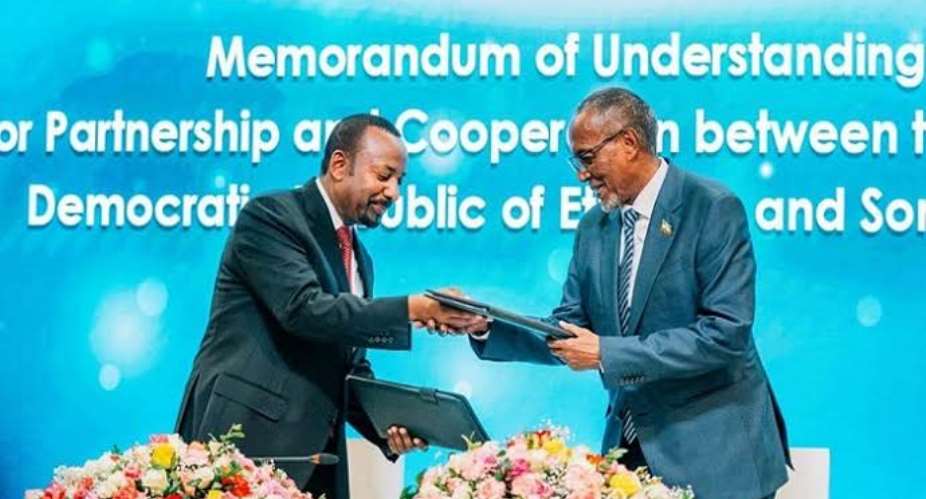Ethiopia's recent agreement with Somaliland, a breakaway region of Somalia, has raised concerns about the balance between potential benefits and disregard for international norms. This article will analyse into the details of the deal, examining its potential advantages, the violation of international laws, and the broader implications for regional stability and state sovereignty.
Historical and Political Context:
Ethiopia, landlocked since Eritrea's secession in 1991, has long sought out partnerships to secure access to vital sea routes and bolster regional integration. In this context, the Horn of Africa's dynamics are significantly impacted by Ethiopia's approach toward the self-declared, yet internationally unrecognized, Somaliland.
To understand this engagement's intricacies, one must first grasp Somaliland's unique status. Situated in the northwestern part of Somalia, Somaliland declared independence in 1991 following the collapse of the Siad Barre regime. Despite its self-declared autonomy and relative stability compared to the rest of Somalia, no UN member state has formally recognized Somaliland's sovereignty.
The Deal's Potential Benefits:
Ethiopia argues that the agreement with Somaliland provides access to the Red Sea and Benefits Somaliland with a stake in Ethiopian Airlines. The Red Sea holds significant strategic importance for Ethiopia as it offers a direct route for trade and maritime access. In addition, the deal includes a stake for Somaliland in Ethiopian Airlines, which could bring economic benefits and help enhance Somaliland's position in the aviation industry. Furthermore, According to Somaliland's President, Muse Biihi, this agreement allows Ethiopia to officially recognize Somaliland as sovereign nation.
Disregard for International Norms:
Despite potential benefits, the deal between Ethiopia and Somaliland raises valid concerns regarding international norms and laws. By engaging directly with Somaliland, Ethiopia undermines the authority of the Federal Government of Somalia, which is the internationally recognized entity responsible for foreign diplomacy and agreements. This disregards the principle that foreign dealings ought to be conducted with the recognized central government of a sovereign nation, as outlined in international law and norms.
By engaging with Somaliland, Ethiopia implicitly challenges the narrative of an indivisible Somali republic, as endorsed by the African Union (AU) and the broader international community. It raises questions about Africa's colonial-era borders' sanctity, often cited by the AU to prevent secessionist movements from gaining momentum and recognition.
Moreover, Ethiopia's incursion into Somalia's sovereignty violates several established international laws. Firstly, the principle of sovereignty, recognized by the UN Charter, stipulates that all nations are equal and deserve respect for their territorial integrity. By engaging with Somaliland without the consent of the Federal Government of Somalia, Ethiopia undermines Somalia's territorial integrity and sovereignty.
Secondly, Somaliland's self-declared independence is not internationally recognized. Most African and global entities still consider it a part of Somalia, making any deal directly with Somaliland inconsistent with the international recognition of statehood.
Thirdly, the Montevideo Convention, which outlines the criteria for statehood, emphasizes factors such as a defined territory, a permanent population, a functioning government, and the capacity to enter into relations with other states. Somaliland does not meet these criteria as it lacks international recognition and is not widely regarded as a sovereign state.
Lastly, recognizing the central government as the responsible authority for foreign affairs is a common practice among nations. By engaging directly with Somaliland, Ethiopia demonstrates a disregard for the principles of state sovereignty, which undermines international expectations.
Long-Term Consequences and Regional Stability:
While Ethiopia may argue that the deal with Somaliland provides short-term benefits, the long-term consequences of undermining Somalia's sovereignty and creating a precedent of engaging with autonomous regions are significant in both countries. By bypassing the Federal Government of Somalia, Ethiopia weakens Somalia's central governance and sets an unhealthy precedent for other regions in both countries to pursue similar autonomous dealings. This may lead to further destabilization and undermine the prospects of maintaining unity and stability in both Ethiopia and Somalia.
Moreover, disregarding international laws and norms erodes trust within the global community. It is crucial for nations to uphold these norms to maintain a stable international order and ensure the protection of state sovereignty. Ethiopia should prioritize constructive dialogue and negotiation with the Federal Government of Somalia, respecting Somalia's territorial integrity and fostering regional stability.
In conclusion, Ethiopia's deal with Somaliland presents a delicate balance between potential benefits and disregard for international norms. While providing access to the Red Sea and potential economic gains, the deal undermines the authority of the Federal Government of Somalia and violates established international laws. Ethiopia should prioritize meaningful dialogue with the central government, respecting state sovereignty and upholding international norms. By doing so, Ethiopia can contribute to regional stability while ensuring its own long-term interests.





 Court dismisses Serwaa Amihere case against Henry Fitz, two others
Court dismisses Serwaa Amihere case against Henry Fitz, two others
 Stolen BRVs: Bi-partisan parliamentary probe non-negotiable — Dr. Omane Boamah
Stolen BRVs: Bi-partisan parliamentary probe non-negotiable — Dr. Omane Boamah
 Bawumia begins regional campaign tour on Monday
Bawumia begins regional campaign tour on Monday
 With great urgency backed by verifiable data, facts and figures dismiss COCOBOD,...
With great urgency backed by verifiable data, facts and figures dismiss COCOBOD,...
 EC’s statement on obsolete BVDs discovery “lies, half-truths, pure fantasies” – ...
EC’s statement on obsolete BVDs discovery “lies, half-truths, pure fantasies” – ...
 Nalerigu court impound vehicles of DCE, Director of Chereponi district for owing...
Nalerigu court impound vehicles of DCE, Director of Chereponi district for owing...
 Cop, 7 others grabbed over $523,000 Gold Scam
Cop, 7 others grabbed over $523,000 Gold Scam
 Akufo-Addo’s driver wins Dadekotopon NPP Parliamentary Primary
Akufo-Addo’s driver wins Dadekotopon NPP Parliamentary Primary
 Investigate, jail persons liable for GRA-SML contract – Manasseh
Investigate, jail persons liable for GRA-SML contract – Manasseh
 Lawyer wins Akan NPP Parliamentary Candidate primary
Lawyer wins Akan NPP Parliamentary Candidate primary
